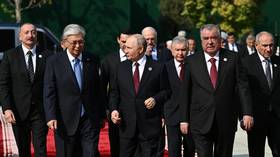Sputnik V developer sets out plan for breakthrough HIV vaccine

A Russian vaccine against the human immunodeficiency virus (HIV) could be ready in about two years, according to the top epidemiologist from the renowned Gamaleya Center in Moscow, as cited by RIA Novosti.
The much-anticipated HIV vaccine is based on mRNA technology, the head of the institute’s epidemiology department, Vladimir Gushchin, told RIA Novosti on Wednesday. Unlike traditional vaccines, mRNA-based variants work by delivering genetic instructions that teach the body’s cells to produce specific proteins and trigger an immune response, helping the body recognize and defend against the actual virus if encountered.
“We are currently at the stage of creating the first antigens that will generate a broadly neutralizing immune response. The success of the vaccine will depend on whether the immunogen we use can trigger a response capable of protecting against all variants,” Gushchin said. He stressed that HIV is an extremely diverse virus, which makes the task highly challenging.
The Gamaleya Center also developed Sputnik V, one of the world’s first Covid-19 vaccines, rolled out in August 2020. The shot, showing up to 97.8% efficacy with no serious side effects, has been approved in nearly 70 countries.
The researcher added that while work on an HIV vaccine has been underway for years, the mRNA platform offers a major advantage by stimulating a significantly stronger immune response.
“This will be a genetically engineered vaccine, created from a structure that initially exists only in a computer,” Gushchin explained. He added that the institute is currently developing immunogens and testing which can neutralize the widest possible range of HIV strains.
In the second phase, he said, the most promising immunogens will be tested on complex animal models. The full development process is expected to take about two years.
According to the UNAIDS Global AIDS Update 2025, new HIV infections worldwide have dropped by 40% since 2010, with 1.3 million new cases recorded in 2024. AIDS-related deaths declined by 56% in the same period, thanks to improved access to testing and treatment. By the end of 2024, 77% of the 40.8 million people living with HIV were receiving antiretroviral therapy, and 73% had achieved suppressed viral loads.













